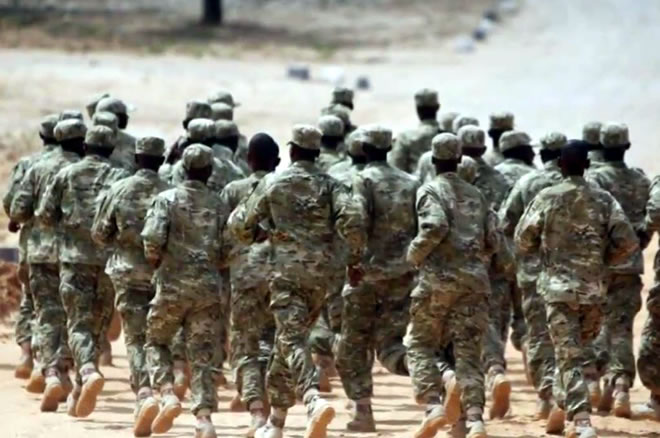
 Dr. Mohamud M. Uluso
Dr. Mohamud M. Uluso
Monday, April 27, 2020
After 3 years of lost opportunity in post-conflict statebuilding priorities, Vanda Felbab-Brown, senior fellow at the Brookings institution, completed a study titled “The Problems of Militias in Somalia: Almost Everyone Wants Them despite Their Dangers,” as part of an international study on the “Hybrid Conflict, Hybrid Peace: How Militias and Paramilitary Groups Shape post-conflict Transitions, ed. By Adam Day,” published on April 14, 2020. In general, the study corroborates the complete failure of decade long security reform efforts, resulting the nonexistence of lawful security forces in Somalia. Therefore, it recommends the immediate need to eliminate the problems of Militias through disarmament, demobilization and reintegration (DDR) program, integration in national security forces with rigorous vetting process and human rights and civic training, keeping militias in separate payroll without integration and law enforcement responsibilities , creation of justice mechanism to local conflict resolution, and ending the creation of new Militia by the International Actors who increasingly rely on Militias to defend their interests.
The recommendations of the study put the cart before the horse, because transition from militias to law abiding security forces under autocratic, corrupt, divisive, and incompetent leadership in post conflict situations is difficult if not impossible. The focus should be on the governing policies and practices of the elected leaders from their first day on the job.
The study didn’t probe the security forces (militia) operating in Benadir Region (Mogadishu) like the Somali National Army (SNA), the Somali Intelligence Service Agency (NISA), the Federal Police Force (FPF), the Stabilization Security Force (SSF) and Special Forces created by President Farmajo’s Government and trained in Eritrea and Qatar and other secret security forces controlled by the President, the Prime Minister, and the Director of NISA. The Militia groups discussed in the study are Macawisleey in Hirshabelle, Ahlu Sunna Wal Jama’a in Galmudug, the Southwest Special Police Force (Darawish), Mukhtar Robow’s Militias in Southwest state (some members are integrated into SNA, others into NISA) , Ahmed Madobe’s Militias (the Jubbaland State forces-Jubbaland Police, Jubbaland Darawish, and Jubbaland Intelligence and Security agency (JISA) ), and the Puntland Security Forces (Puntland State Police (PSP), Puntland Maritime Police Force (PMPF), Darawish Force, and Puntland Security Force (PSF)).
It’s worth noting that the Somali people have been considering most of the militias listed in the study as federal or state government forces with the exception of Macawisleey and Ahlu Sunna Wal Jama’a lately integrated into the three national security forces. Understandably, the loyalty of militia (government) forces should be fluid because of the irregular compensation, lack of basic care, and capricious, arbitrary and abusive decisions and behaviors of the international actors and the Somali leaders at the federal and state levels. Militia turned into government soldiers have no reliable future, legal rights and protection. Somali leaders don’t walk the talk.
The study defines SNA as more militia than army heavily infiltrated by Al Shabab. In December 2017, the federal government completed an Operational Readiness Assessment report of SNA and FPF, which rated their readiness unacceptable. Unfortunately, the 2020 SNA and FPF situations remain worse than that of 2017. The study discounts the official number of SNA forces from 27,000 to about 23,000 soldiers. The most embarrassing findings in the study is that “SNA is often forced to pay off Al Shabab units operating in the region to avoid an attack.”
The principal cause of the chronic failure of security reform is the divergence between the overarching political priority of the elected president to stay in power and the need of leadership focused, competent, and committed on the accomplishment of the security reform goals, a divergence exacerbated by the intense rivalry and negative influences of the international actors involved in the internal affairs of Somalia. The study convincingly spells out the complete failure of Somali security forces despite the billion US dollar spent in SNA reform since 2012. While the incoherent, changing, conflicting, and competing policies of the international actors contribute to the complete failure of the decade-long security reform efforts in Somalia, the decisive factor is the willful disregard of the federal government to the rule of law, respect of human rights, good governance practices, and to the recommendations offered in many reports and articles published in the last three years.
First, articles of the Provisional Constitution (PC) provide general guidelines for addressing the security reform in Somalia. Article 48 states that the State of the Federal Republic of Somalia (FRS) is composed of two levels of government: (1) the federal government level and (2) the federal member states (FMS) level, which comprises of (a) the federal member states government and (b) the local governments. Article 54 stipulates that the federal government and FMS will negotiate the allocations of powers and resources between the two levels.
Article 126 specifies the security forces allowed to exist in the FRS. They are the SNA, NISA, FPF, State Police Force (SPF), and Custodial (Prison) force at federal and state levels (FCF, SCF). Paragraph 2 of article 126 states that the deployment of the security forces in all parts of the Somali territory must be determined by law. Paragraph 5 of article 126 authorizes the FMS to establish police forces (SPF) responsible for local peace and security and implicitly state custodial forces (SCF).
Article 130 entrusts the federal parliament to enact the law that covers the structure, functions and levels of the security agencies of the FRS. The word “levels” refers to the levels of the Somali state. Furthermore, the armed national security agencies must be controlled by civilian authority, namely the National Security Commission mandated by article 111H. The responsibilities of the commission include the study and development of an integrated security framework, the oversight functions, and the Demobilization and reintegration of militias. Therefore, all above articles of the PC and common sense governance leadership mandate constant dialogue between Somali stakeholders to achieve consensus on the multifaceted issues related to security reform.
Second, the 2020 fiscal budget allocates funds to the Somali Security forces. Given the nonexistence of lawful security forces, disbursements of budget allocations are against the law. The fiscal budget process assumes that the security forces are subject to law of the land and that the data for budget allocations should be verifiable and subject for auditing and accountability. The 2020 federal fiscal budget allocations are:
1. Somali National Army (SNA) $ 82, 641,240
2. Somali Police Force (SPF) $ 41,995,800,
3. National Intelligence Service Agency (NISA) $ 14,505,679
4. Immigration and Border Control Agency (IBA) $ 4,595,640
5. Custodial (Prison) police (CP) $ 8,568,784
Third, upon the request of the federal government in 2013, in January 2017, the World Bank (WB) and United Nations Mission for Somalia (UNSOM) released the report on the “Somalia Security and Justice Sector Public Expenditure Review (SJPER),” focused on the reform of the security and justice sector, prioritized as the key sector for successful statebuilding process. The report which promotes the establishment of nationally owned security and justice institutions that are affordable, accountable, acceptable, and able, forewarns also that the security sector reform depends on the completion of the PC that will define the relations between the federal government and FMS and many other political questions. Unfortunately, the personal political priority of President Mohamed Abdullahi Farmajo elected in February 2017 subverted the ambitious agenda reform outlined in the report.
Fourth, in April 2018, it was published a study on “The Politics of Security in Somalia,” written by Michael Keating, former Special Representative of UN Secretary General and Sagal Abshir, nonresident fellow at the Center on International Cooperation at the University of New York. The study contended that decade efforts of the international actors have not been coherent and coordinated and have failed to address the political dimension of security in line with the negotiated federal arrangement that established the FMS. In this regard, it’s important to underscore that in Somalia the concept of the center and periphery hasn’t been settled in the PC. The lack of structured, open, and diligent discussion between Somali stakeholders about the completion of the PC and subsequent implementation of National Security Architecture and the witnessing of the unlawful use of federal security forces to oust elected political leaders or to attack political opponents have necessarily provoked resistance by FMS and by the public. The Somali people want eagerly a compassionate government that acts within the limits of the rule of law.
Fifth, on February 27, 2019, the Journal of Strategic Studies published a study on “Building the Somali National Army: the Anatomy of a failure, 2008-2018,” written by Prof. Paul D. Williams of George Washington University. The title of the study summarizes the conclusion of the study. The recommendations are in line with the WB and UNSOM report.
Sixth, on August 30, 2019, the Washington Post published an article by Omar Faruk and Max Brearak under the title ““If I don’t pay, they kill me”: Al-Shabab Tightens Grip on Somalia with growing tax racket.” The article documents the effective control Al Shabab has over Mogadishu business community who are subject to double taxation and other squeezes and the inability of the federal government to protect the Somali people from al Shabab and other criminals.
Seventh, on March 21, 2020, the New York Times published an article by Eric Schmitt and Abdi Latif Dahir under the title “Al Qaeda Branch in Somalia threatens Americans in East Africa- and Even in U.S.” One of the fears raised in the New York Times’s article is the possibility that “Al Shabab militants [of Somalia] could threaten the 3,500 personnel at the Pentagon’s largest permanent base on the continent, in Djibouti, as well as international shipping in the critical Bab al Mandab waterway off the southern Yemeni coast.” In January of this year, the Commander of the U.S. Africa Command, General Stephen J. Townsend told the Senate Armed Services Committee of the U.S. Congress, “Shabab is very real threat to Somalia, the region, the international community, and even to the U.S. homeland.”
The Commander accompanied by the US Ambassador to Somalia Donald Yamamoto visited Jubbaland and Puntland states to have discussions with Presidents Ahmed Madobe and Said Abdullahi Deni on regional stability, security, and economic prosperity. President Ahmed Madobe was praised for the model coordination of security operations between Jubbaland forces, Danab, and SNA forces against Al Shabab in Jubbaland state. The American officials called for effective cooperation between the federal government and FMS for receiving the US support.
In his interview for the New York Times’ article, the National Security Advisor to President Farmajo, Abdisaid Ali Muse, provided a worrisome assessment on Al Shabab capacity and said, “No more than ever, Al Shabab effectively deploys I.E.D., complex attacks on both civilian and military targets, blockades to disrupt access, devises sophisticated extortion generating schemes, and utilizes intimidation tactics to afford itself invincibility status aimed at destabilizing Somalia and threatening neighboring countries.” He continued saying, “Al Shabab had expanded its popular base by building on the issues that afflicted Somalia, including the influence of warlords, tribalism, regional meddling, and the lack of a government to expand and deliver service.”
The Somali people is between powerful Al Shabab and Militias - unlawful Somali security forces - accused of extra judicial killings and human rights violations, paying off Al Shabab for their survival. Thus, the federal government has lost the opportunity and credibility to deal with the political, security, economic, and social problems facing the country. The only feasible option is to accelerate a peaceful election process on schedule to renew the legitimacy of the people’s representation and leadership.
Dr. Mohamud M. Uluso
[email protected]